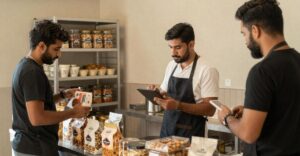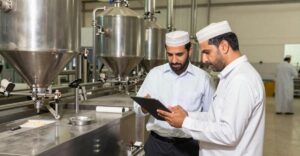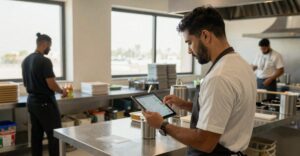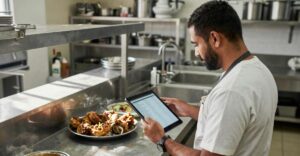Sustainability & Upcycled Ingredients: Shaping the Future of UAE’s Food Industry
The UAE food industry is undergoing a major transformation. With rising awareness of climate change, food waste, and sustainable consumption, both businesses and consumers are demanding greener solutions. One of the fastest-growing trends is the use of upcycled ingredients — turning food byproducts into value-added, sustainable products.
Globally, this trend has already taken shape. According to the Upcycled Food Association, the upcycled food economy is expected to exceed $80 billion by 2032, showing how mainstream this innovation is becoming. For the UAE, where sustainability is central to the UAE Net Zero 2050 initiative, upcycling presents a golden opportunity for food brands, startups, and manufacturers.
At Tech4Serve UAE, our role as leading Food Business Consultants is to help businesses embrace such innovations — from concept to execution — while ensuring compliance, scalability, and market readiness.
What Are Upcycled Ingredients?
Upcycled ingredients are created by reusing food byproducts that would otherwise go to waste. For example:
- Spent grains from breweries transformed into high-protein flour.
- Fruit peels repurposed into natural sweeteners or dietary fibers.
- Coffee grounds converted into sustainable snacks or even cosmetic products.
Instead of discarding these byproducts, food innovators reprocess them into nutritious, eco-friendly ingredients that add value to consumer products.
This innovation aligns with the global movement toward circular economies, reducing waste while creating new revenue streams.
Why UAE Food Businesses Should Care
1. Align with Sustainability Goals
UAE consumers are increasingly eco-conscious. By integrating upcycled ingredients, brands can support Dubai Municipality’s food waste reduction programs and the UAE Food Security Strategy 2051.
2. Unlock New Market Opportunities
Health-focused and environmentally aware consumers are actively seeking sustainable brands. By using upcycled ingredients, food companies can attract these segments while strengthening their clean label positioning.
3. Reduce Production Costs
Upcycling allows businesses to make use of materials that would otherwise be discarded. This creates cost efficiencies while reducing waste disposal expenses.
4. Strengthen Brand Differentiation
Sustainability-driven innovation gives businesses a competitive edge, especially in categories like bakery, snacks, and beverages, where upcycled ingredients can enhance nutrition profiles and brand storytelling.
Real-World Examples
- PepsiCo has invested in upcycled potato starch to improve production efficiency.
- Kellogg’s partnered with UK breweries to create beer from excess cereal.
- In the region, startups are experimenting with date seeds, fruit pulps, and coffee waste to develop innovative F&B products.
This is a clear signal for UAE brands to act early and capture the market potential.
How Tech4Serve UAE Can Help
At Tech4Serve, we bring global expertise and a local market perspective to help UAE food businesses adopt sustainability-focused models. Our services include:
- Product Development & Reformulation: Creating recipes with upcycled ingredients while maintaining taste and texture. (Explore our Food Product Development Consultants expertise.)
- Food Factory Setup & Design: Guiding businesses through efficient, eco-friendly setups as Turnkey Food Factory Consultants.
- Compliance Support: Ensuring products meet UAE regulatory standards and international guidelines.
- Supply Chain Integration: Connecting businesses with global and regional suppliers of sustainable ingredients.
- Marketing & Branding Strategy: Helping brands communicate sustainability effectively to build consumer trust.
Challenges in Adopting Upcycled Ingredients
While promising, businesses should be prepared for:
- Regulatory approvals (labeling, food safety).
- Consumer education (explaining the concept of upcycling).
- Supply chain readiness (securing consistent byproduct sources).
With the right consultancy partner, these hurdles can be managed effectively, ensuring smooth product launches and market acceptance.
Conclusion
The UAE’s F&B sector is moving toward a sustainable, future-proof ecosystem. Upcycled ingredients are not just a passing trend — they’re becoming essential for brands aiming to stand out, reduce waste, and meet evolving consumer demands.
At Tech4Serve UAE, we help businesses transform these opportunities into reality, ensuring that your brand remains relevant, profitable, and aligned with the UAE’s sustainability vision.
If you’re ready to explore how upcycled food innovation can redefine your business, let’s talk.
FAQs
Q1: What foods can be made with upcycled ingredients?
Bakery products, protein bars, beverages, condiments, and even functional snacks are popular categories.
Q2: Are upcycled ingredients safe?
Yes. Once processed under regulated food safety standards, they are safe and approved for consumer use.
Q3: Does using upcycled ingredients increase costs?
Initially, yes. But in the long run, they help reduce waste management expenses and offer premium positioning benefits.
Q4: How can UAE businesses market such products?
By highlighting sustainability, health benefits, and transparent sourcing — all key to consumer trust.







